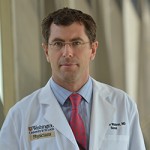
Ashima Chadha
An opportunity to nurture a budding interest in nephrology led medical student Ashima Chadha to the Humphreys Laboratory this past summer.
Ashima, who came to WU from Duke University where she received a B.S. in Mathematics and minors in Chemistry and Asian/Middle Eastern Studies, was first drawn to nephrology research when she was an undergraduate. After her freshman year at Duke, Ashima had the opportunity to work for the summer in the laboratory of Dr. Alan Yu, Kidney Institute Director at the University of Kansas.
“I had never worked in a wet lab before, so it was a steep learning curve, but the lab had a really great community of people who were great friends and mentors,” says Ashima. “I enjoyed it so much that I came back to continue research for another couple summers as well – so I got pretty good at running Western blots.”
During her first year in medical school here at WU, Ashima was put in touch with Benjamin Humphreys, MD, PhD, Chief of the Division of Nephrology, by Professor of Medicine, Will Ross, MD, MPH. Dr. Ross works closely with the incoming first year medical students as part of the Washington University Medical Plunge (WUMP) program, which he founded. During orientation week, WUMP introduces the students to St. Louis history, the subject of health disparity and the patient population the students will be working with.
 “Dr. Humphreys invited me to work in his lab for the summer.” Pointing out that WU has incredible funding for students interested in doing research the summer between the first and second year of medical school, Ashima says, “I thought it would be a great way to explore some other areas of nephrology research. I could still use my background, but also learn some new techniques.”
“Dr. Humphreys invited me to work in his lab for the summer.” Pointing out that WU has incredible funding for students interested in doing research the summer between the first and second year of medical school, Ashima says, “I thought it would be a great way to explore some other areas of nephrology research. I could still use my background, but also learn some new techniques.”
Because Ashima had coding experience due to her background in mathematics, Dr. Humphreys recommended that she work on a project with Assistant Professor of Medicine, Andrew Malone, MB, BCh, and Bioinformatician Sai Mukund Ramakrishnan, who were using single cell RNA-seq data to analyze gene expression patterns of biopsies from a kidney transplant undergoing antibody-mediated rejection.

Andrew Malone, MB, BCh
“Ashima was a huge addition to our research team this summer,” says Dr. Malone. “She worked on our transplant biopsy single cell dataset, and in a few short weeks she was already making a significant contribution to our analysis. Her background in mathematics and coding gives her a huge advantage in the field of modern molecular genomics.”
Ashima praised Dr. Malone and Sai as being phenomenal mentors. “All these research experiences, in combination with shadowing and the great teachers and mentors we have from the nephrology department who are involved with our medical school curriculum, have definitely piqued my interest in nephrology.” She is excited that she and one of her classmates (Zach Jaegar) and will be attending the upcoming Kidney Week 2018 Conference in San Diego as part of the Kidney STARS program.
In addition to her studies, Ashima makes time to be part of the leadership groups for the Pediatric Outreach Program (POP) and the WU Global Health and Medicine community outreach committee. For the latter, she says, “I mostly help out with organizing volunteering opportunities with local refugee populations or with health fairs at the International Institute. Most of my extracurricular time is actually spent as a math tutor at the Juvenile Detention Center about ten minutes away from here.”
Considering her time at WU, Ashima says, “It’s nice being able to come back to the Midwest and be closer to home.” Ashima’s family lives in Kansas City, KS. Her father, a pediatric nephrologist at Children’s Mercy Hospital Kansas City, and her mother, an OB/GYN physician at Swope Health Services, are her “top role models”. “While they’ve encouraged me to follow whichever path I choose, they also inspired me to go into medicine,” she says.
Although Ashima can’t say for certain where she will end up, she claims that the field of nephrology is one of her favorites. “The people I have met have all been wonderful and the kidney itself is one of the most interesting and awesome organs we’ve learned about – so maybe I will end up in the specialty! In the meantime, I will definitely be making time to continue research.”
“I have no doubt that Ashima will achieve great things in her career and we would be lucky to have her join the nephrology family,” says Dr. Malone.